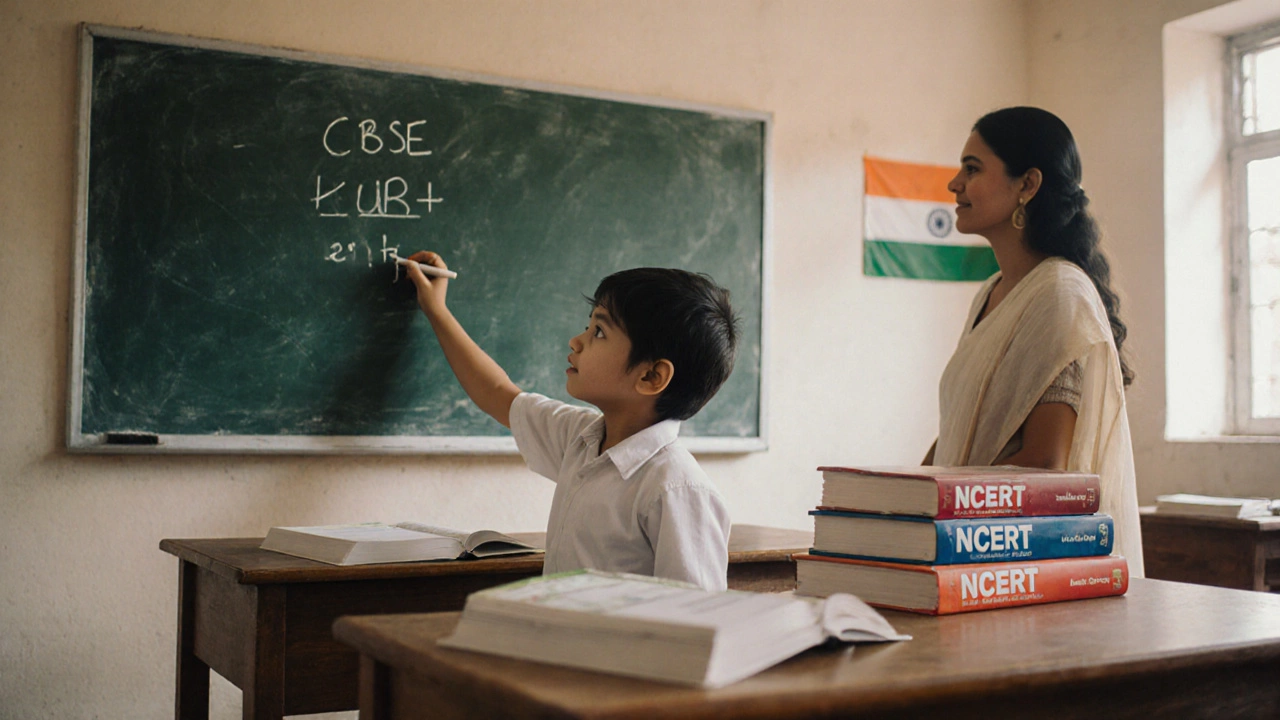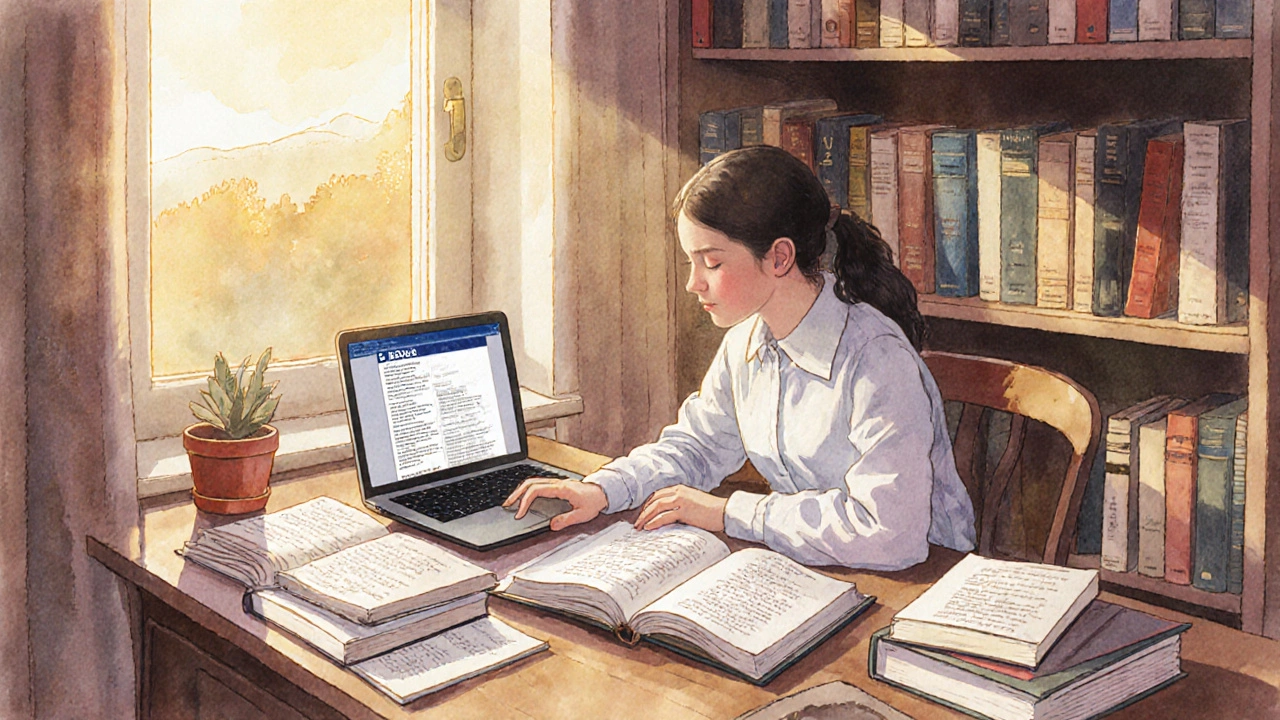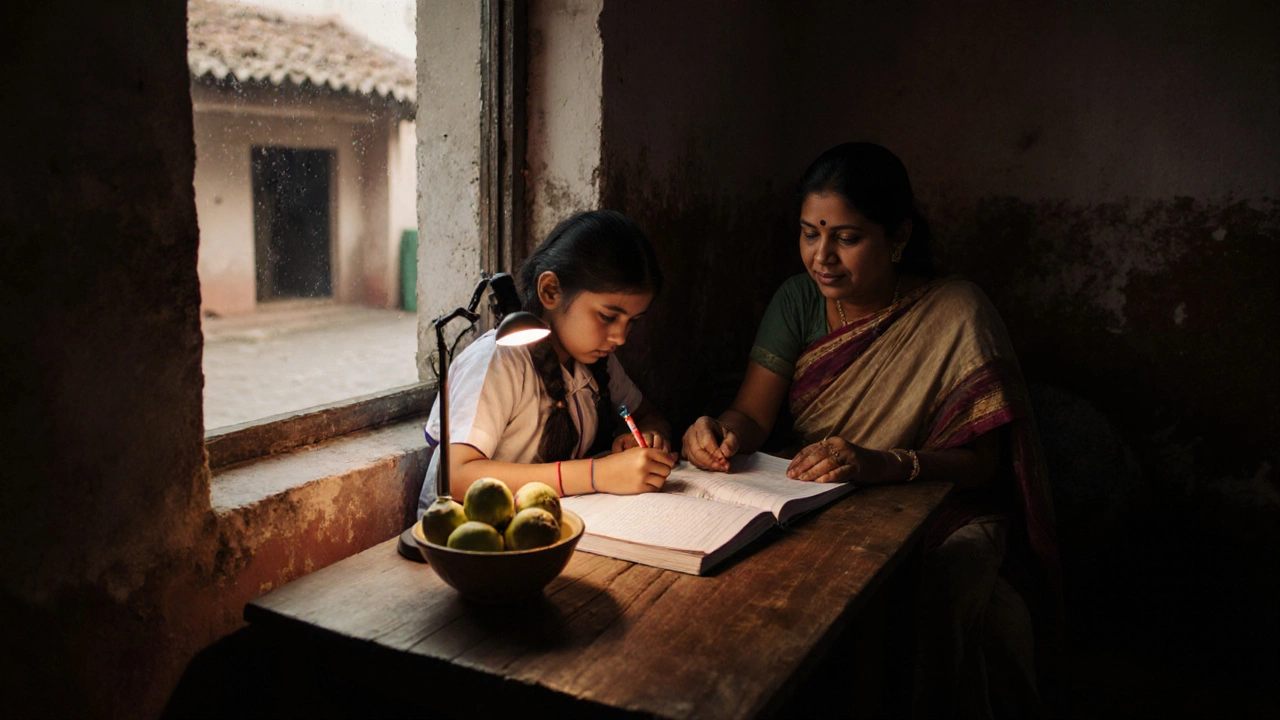Which Board Is Best for My Child? CBSE vs ICSE vs State Boards Explained
 Nov, 28 2025
Nov, 28 2025
Choosing the right education board for your child isn’t about picking the most popular one-it’s about matching the system to your child’s learning style, future goals, and family priorities. With so many options-CBSE, ICSE, and various state boards-it’s easy to feel overwhelmed. But the truth is, there’s no single "best" board. The right one depends on what your child needs right now and where they might be headed in five or ten years.
What Is CBSE and Why Do So Many Parents Choose It?
The Central Board of Secondary Education (CBSE) is the most widely followed board in India, with over 20,000 affiliated schools across the country and abroad. It’s the default choice for families who move often, plan to take national entrance exams, or want a streamlined curriculum.
CBSE focuses on core subjects like Math, Science, and English. Its syllabus is designed to be clear, structured, and exam-oriented. That means less emphasis on creative writing and more on problem-solving, formulas, and standardized testing. If your child is aiming for IIT JEE, NEET, or other national competitive exams, CBSE is the most direct path. The NCERT textbooks used in CBSE schools are the official study material for these exams, so there’s no gap between school learning and exam prep.
Students in CBSE schools typically start preparing for competitive exams as early as Class 8. The board’s pattern-multiple-choice questions, objective-type papers, and a focus on accuracy-builds test-taking skills early. That’s why over 70% of IIT JEE and NEET aspirants come from CBSE backgrounds.
How Does ICSE Compare? A Deeper, Broader Approach
The Indian Certificate of Secondary Education (ICSE), run by the Council for the Indian School Certificate Examinations (CISCE), takes a different route. It’s known for being more detailed, comprehensive, and language-heavy. ICSE requires students to study a wider range of subjects, including Environmental Science, Art, and a second language-even if it’s not their mother tongue.
ICSE places strong emphasis on English. Students read literature, write essays, and analyze texts in depth. If your child enjoys reading, writing, and expressing ideas, ICSE gives them more space to grow. The exams are subjective, with long-form answers and detailed marking schemes. This helps build critical thinking and communication skills-but it also means more pressure during exams.
ICSE is often preferred by families targeting international universities. Many foreign colleges recognize ICSE as equivalent to the British GCSE system. The board’s focus on application over rote learning makes it a good fit for students who thrive in project-based or discussion-driven environments. But if your child struggles with long answer formats or gets stressed under open-ended questions, ICSE can feel overwhelming.
State Boards: Local, Practical, and Often Overlooked
State boards vary wildly depending on where you live. In Maharashtra, it’s the Maharashtra State Board; in Tamil Nadu, it’s the Tamil Nadu State Board. These boards are designed for local contexts. The curriculum often includes regional languages, local history, and state-specific content.
The upside? State boards tend to have lighter syllabi and less pressure. Exams are usually more straightforward, with a focus on basic understanding rather than complex problem-solving. For families who don’t plan to leave their state or compete nationally, this can be a relief. Many students from state boards do well in local engineering and medical colleges.
But here’s the catch: if your child later wants to take IIT JEE, NEET, or apply to top national colleges, they’ll need to bridge the gap. State board syllabi often don’t align with the depth required for these exams. You might need extra coaching, private tutors, or self-study to catch up. That’s not impossible-but it’s an added layer of effort.

What About Future Goals? Match the Board to the Path
Let’s say your child shows early interest in engineering. CBSE is the obvious pick. The syllabus mirrors JEE patterns, and most coaching centers design their programs around NCERT. Switching to ICSE or a state board at this point would mean relearning content from scratch.
If your child loves literature, journalism, or wants to study abroad, ICSE gives them a stronger foundation in English and critical analysis. Universities in the UK, Canada, and Australia often prefer ICSE because of its rigorous English component and broader subject exposure.
For kids who want to stay close to home-maybe they’ll join a state university or take a local government job-a state board works perfectly fine. Many successful doctors, engineers, and civil servants came from state boards. The key is not the board, but the effort they put in.
Here’s a simple rule: if your child is likely to take a national competitive exam, go CBSE. If they’re more inclined toward arts, humanities, or international education, consider ICSE. If you’re settled locally and want a balanced, low-stress environment, a state board can be ideal.
Real-Life Scenarios: What Works for Real Families
Take the Patel family in Ahmedabad. Their daughter was doing well in a state board school but struggled with science concepts. They switched to CBSE in Class 6. Within a year, her confidence in Physics and Chemistry improved. By Class 10, she was scoring above 90% and is now preparing for NEET with focused coaching.
On the other hand, the Joshi family in Pune chose ICSE because their son loved writing. He started publishing short stories in school magazines by Class 7. His English teacher said he wrote like a college student. He’s now applying to universities in the UK for literature and media studies.
Then there’s the Rao family in rural Karnataka. They stayed with the state board because they couldn’t afford private coaching. Their daughter passed her SSLC with 85%, got into a local government medical college, and is now a practicing doctor. Her success had nothing to do with the board-it had everything to do with her discipline and support system.
What Parents Often Get Wrong
Many parents think CBSE is "better" because it’s popular. But popularity doesn’t mean suitability. A child who hates memorizing formulas will suffer in CBSE, even if they’re brilliant at thinking creatively.
Others believe ICSE is "elite" and push their kids into it without checking if they can handle the workload. ICSE isn’t harder-it’s different. It demands more reading, writing, and independent thinking. If your child needs structure and clear guidelines, they might feel lost.
And then there’s the myth that state boards are "inferior." They’re not. They’re just designed for different outcomes. Many state board students go on to top colleges, especially if they’re motivated and get the right support.

How to Decide: A Quick Checklist
- Does your child plan to take IIT JEE, NEET, or other national exams? → CBSE is the safest bet.
- Does your child love reading, writing, and discussing ideas? → ICSE gives them room to grow.
- Are you staying in one state long-term? → A state board can be stress-free and effective.
- Do you plan to move abroad? → ICSE has better international recognition.
- Is your child easily overwhelmed by exams? → State board or CBSE (with lighter workload) may be better than ICSE.
There’s no point in forcing a square peg into a round hole. The best board is the one that helps your child learn, not the one that looks the best on paper.
What If You’re Already Enrolled and Want to Switch?
Switching boards is possible-but it’s not simple. The best time to switch is before Class 6 or Class 9. After that, the syllabus gaps become harder to fill.
If you’re moving from a state board to CBSE, your child will need to catch up on topics like Physics formulas, Chemistry nomenclature, and Math concepts that weren’t covered. A few months of targeted tutoring can help.
Switching from CBSE to ICSE means ramping up reading and writing. Your child will need to practice essay writing, poetry analysis, and longer answers. It’s doable, but it takes time and patience.
Don’t switch just because someone told you to. Switch only if you see a clear benefit for your child’s learning and well-being.
Final Thought: It’s Not the Board, It’s the Support
At the end of the day, no board guarantees success. What matters is how much support your child gets-at home, in school, and from themselves. A motivated student in a state board school can outperform a disengaged one in CBSE. A loving, involved parent who helps with homework, encourages questions, and celebrates small wins makes more difference than any syllabus.
Ask yourself: Does my child feel confident? Do they enjoy learning? Are they curious? If the answer is yes, then you’re already on the right path-no matter the board.
Is CBSE easier than ICSE?
CBSE isn’t easier-it’s more focused. It covers fewer topics but dives deeper into exam-relevant areas like Math and Science. ICSE covers more subjects and expects detailed written answers, which many students find harder. The difficulty depends on your child’s strengths: if they’re good at memorizing formulas, CBSE feels easier. If they’re strong in writing and analysis, ICSE might feel more natural.
Can a student from a state board get into IIT?
Yes, absolutely. Many IIT toppers come from state boards. The key is extra preparation. Since state board syllabi don’t always align with JEE, students need to study NCERT books, solve past papers, and take coaching. It’s more work, but it’s been done successfully by thousands of students every year.
Which board is best for English skills?
ICSE is the clear winner for English. It requires students to read novels, write essays, analyze poetry, and understand grammar in depth. CBSE focuses on functional English-reading comprehension, letter writing, and basic grammar. State boards vary, but most prioritize regional languages over advanced English.
Should I choose CBSE if I want my child to study abroad?
CBSE is accepted worldwide, but ICSE is often preferred. Many international universities see ICSE as more comparable to British or American high school systems because of its broader curriculum and emphasis on English. CBSE students can still get in-they just need to strengthen their application with extracurriculars, standardized tests like SAT or IELTS, and strong recommendation letters.
Is it too late to switch boards after Class 8?
It’s not impossible, but it’s challenging. The syllabus differences between boards become more pronounced after Class 8. Switching to CBSE from a state board means catching up on topics like Heredity, Chemical Reactions, and Quadratic Equations. Switching to ICSE means building writing stamina. If you do switch, plan for 6-12 months of extra support-tutors, practice papers, and consistent revision.